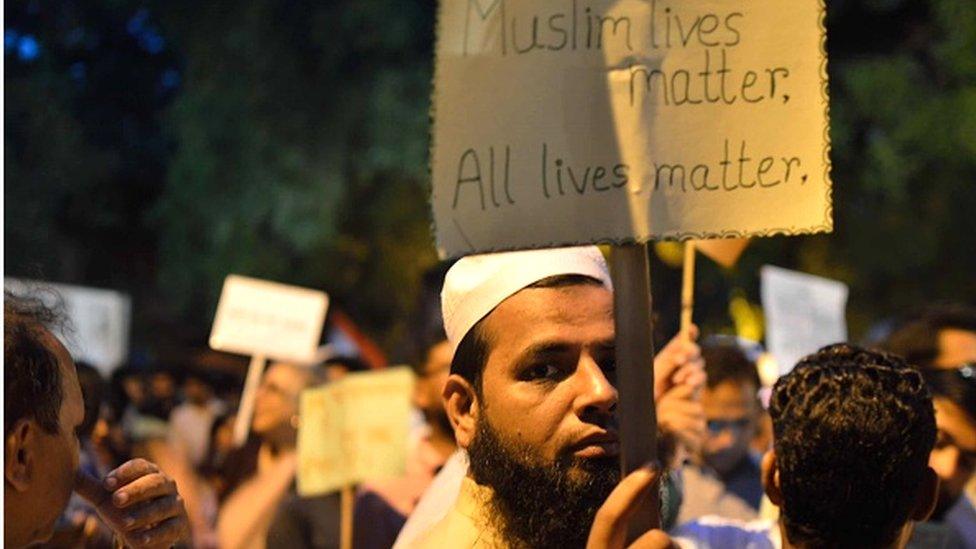Nupur Sharma: The Indian woman behind offensive Prophet Muhammad comments
- Published
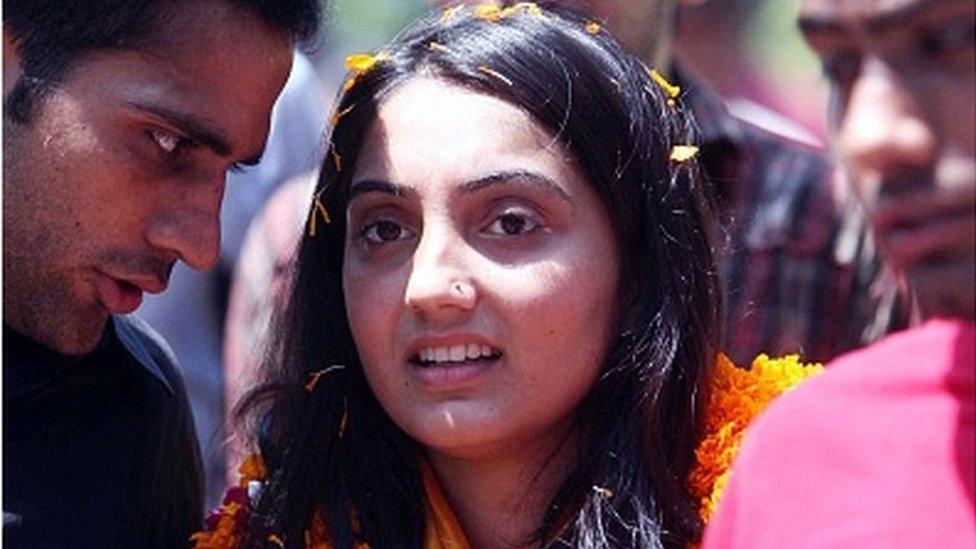
The BJP has suspended Nupur Sharma
India's top court has rebuked a former spokesperson of the ruling Bharatiya Janata Party (BJP) over her controversial comments about the Prophet Muhammad.
Nupur Sharma's remarks, made in a TV debate in May-end, incensed Indian Muslims and outraged Islamic nations.
On Friday, the Supreme Court said that "her loose tongue has set the entire country on fire" and blamed her for "igniting emotions across the country".
The judges also observed that "her outburst is responsible for the unfortunate incident at Udaipur" - a reference to the beheading three days back by two Muslim men of a Hindu tailor who had supported Ms Sharma on social media platforms.
Following protests from several Islamic nations, including the UAE, Saudi Arabia, Qatar and Iran, over her controversial remarks, the BJP suspended Ms Sharma from the party last month. The head of the party's Delhi media unit, Naveen Kumar Jindal, was also expelled for sharing a screenshot of her offensive comment in a tweet.
In a statement, the BJP said it was "against any ideology which insults or demeans any sect or religion" and added that it did not "promote such people or philosophy".
And in an attempt to placate angry Islamic nations, Indian diplomats said the comments did not reflect the stand of the government and that they were "views of fringe elements".
But as many pointed out, Ms Sharma was no fringe element.
Until she was axed, the 37-year-old lawyer was a much sought-after "official BJP spokesperson" who appeared night after night on TV debates to represent and defend Prime Minister Narendra Modi's government.
A student of law at Delhi University, Ms Sharma began her political career in 2008 when she was elected as the president of the students' union as a candidate of Akhil Bharatiya Vidyarthi Parishad (ABVP), the student wing of the Hindu nationalist Rashtriya Swayamsevak Sangh movement.
Her political career picked up pace in 2011 when she returned to India after doing her masters in international business law from the London School of Economics.
Brash and articulate, her ability to argue and put forth her point of view in both English and Hindi won her a place in the BJP's media committee for the 2013 Delhi assembly elections.
Two years later when fresh elections were called, she was the BJP's candidate against Delhi Chief Minister Arvind Kejriwal.
It was not an election anyone expected her to win, but her energetic campaign brought her further into the limelight - she was appointed an official spokesperson for the party in Delhi and in 2020, she became a "national spokesperson" for the BJP.
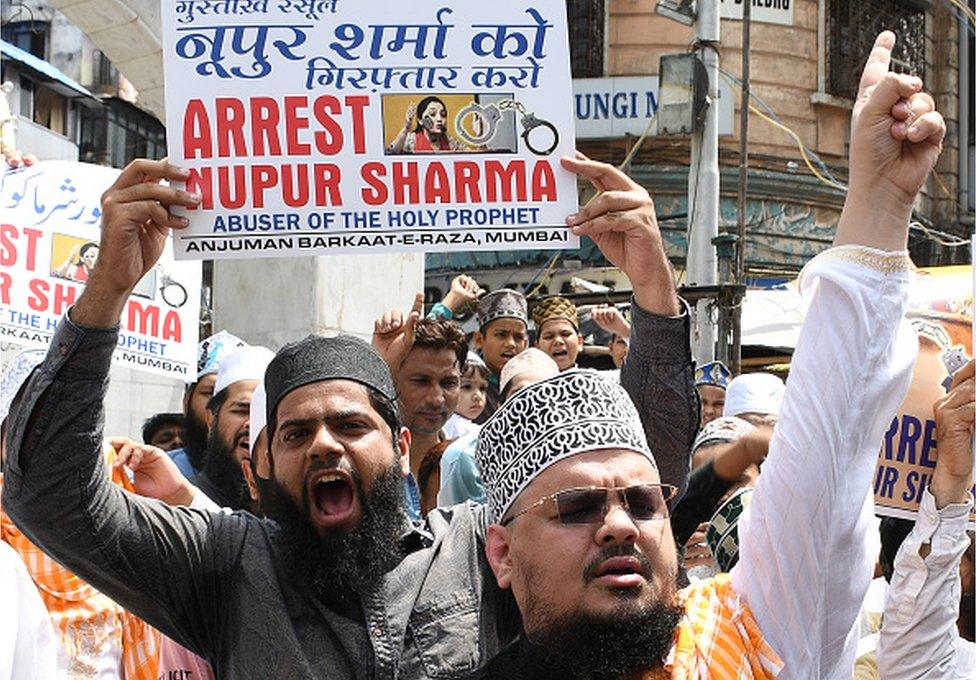
Protesters have demanded the arrest of BJP spokesperson Nupur Sharma for her "blasphemous comments"

In the past few years, Ms Sharma became a familiar face for Indian TV audiences. On most evenings, she was seen and heard shouting at and heckling her political opponents, even calling them names.
In a short clip shared extensively by her supporters on Twitter recently, she called a panellist "a bloody hypocrite and a liar" and told him to "shut up".
When she shared the clip on Twitter, where she counts Prime Minister Narendra Modi among her more than half a million followers, her supporters praised her, calling her "a lioness, and a fierce and fearless warrior".
In a statement following her sacking, Ms Sharma wrote that she was withdrawing her remarks "unconditionally", external, but she made an attempt to justify her comments by claiming that they were in response to "the continuous insult and disrespect towards the Hindu god Shiva".
Her offensive comments were made during a debate on the dispute over the Gyanvapi mosque.
Hindus claim that the mosque in the holy city of Varanasi is built on the ruins of a grand 16th Century Hindu shrine - destroyed in 1669 by Mughal emperor Aurangzeb - and some are now seeking a court's permission to pray within the mosque complex.
A controversial court order, which allowed a video-recorded survey of the mosque, is said to have revealed a stone shaft that the petitioners claim is a Shivalinga, the symbol of Shiva. But mosque authorities insist that it's a water fountain.
The dispute is being heard in court, but the claims and counter-claims are being debated endlessly on TV channels and Ms Sharma has been a loud and vocal proponent of the Hindu nationalist point of view.
On 27 May, with her abusive comments against Prophet Muhammad, she appeared to have bitten off more than she could chew.
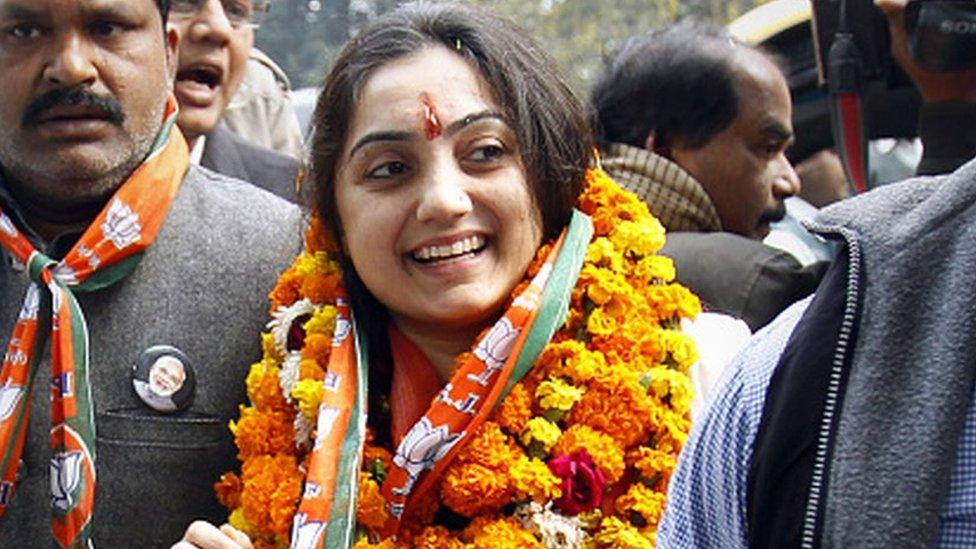
Nupur Sharma contested Delhi assembly elections in 2015
After journalist and fact-checker Mohammed Zubair shared a clip of her outburst on Twitter, she tweeted to Delhi police saying that she was being "bombarded with rape, death and beheading threats against my sister, mother, father and myself".
She accused Mr Zubair of "peddling a fake-narrative to vitiate the atmosphere, cause communal disharmony & cause communal & targeted hatred against me & my family" - accusations he denied. (Mr Zubair has since been arrested, for allegedly "insulting Hindu religious beliefs" but opposition leaders, journalists and activists claim it is "for exposing Ms Sharma's hate speech".)
In her tweets, she tagged PM Modi, Home Minister Amit Shah and BJP president JP Nadda.
Three days later, she told a sympathetic interviewer that "the prime minister's office, the home minister's office and the party president's office were rallying behind me".
But trouble began to mount for her when a protest by Muslims against her comments in Kanpur, a city in the northern Indian state of Uttar Pradesh, turned violent.
The state, led by hardline Hindu monk Yogi Adityanath of BJP, came down heavily on the protesters, external, lodging complaints against hundreds of Muslims and arresting dozens of them.
But Ms Sharma and the BJP couldn't brazen it out any longer - especially after countries in the Middle East began condemning her statement; Kuwait, Iran and Qatar summoned Indian ambassadors and Saudi Arabia issued a strong statement. Even the UAE, whose relationship with India has significantly improved in the past few years, criticised the comments.
As calls grew louder for Ms Sharma to be arrested for her "blasphemous comments", and police in several opposition-ruled states opened investigations against her, Delhi police strengthened her security, citing a threat to her life from a militant group. They also registered a case against her over her comments, but more than three weeks later, they have been criticised for taking no action against her.
Ms Sharma herself has not been seen or heard since 5 June when she tweeted the statement "withdrawing" her comments.
But since her suspension, supporters of the beleaguered former BJP spokesperson have made hashtags such as #ISupportNupurSharma and #TakeBackNupurSharma and they trend almost daily on social media, with tens of thousands praising her.
But what transpired in the Supreme Court on Friday is being seen as a huge setback for Ms Sharma.
When her lawyers requested the court to club all the cases filed against her in different parts of the country and transfer them to Delhi so she doesn't have to run around, the judges called her out for her "obstinate and arrogant character" and said that she should appear on a TV channel and "apologise to the whole nation" for her remarks.
Some commentators point out that many top Indian politicians have got away with making hateful comments and that this controversy may not mean the end of Ms Sharma's political career. But the criticism from the top court justices could prolong her time in the political wilderness.
- Published7 June 2022
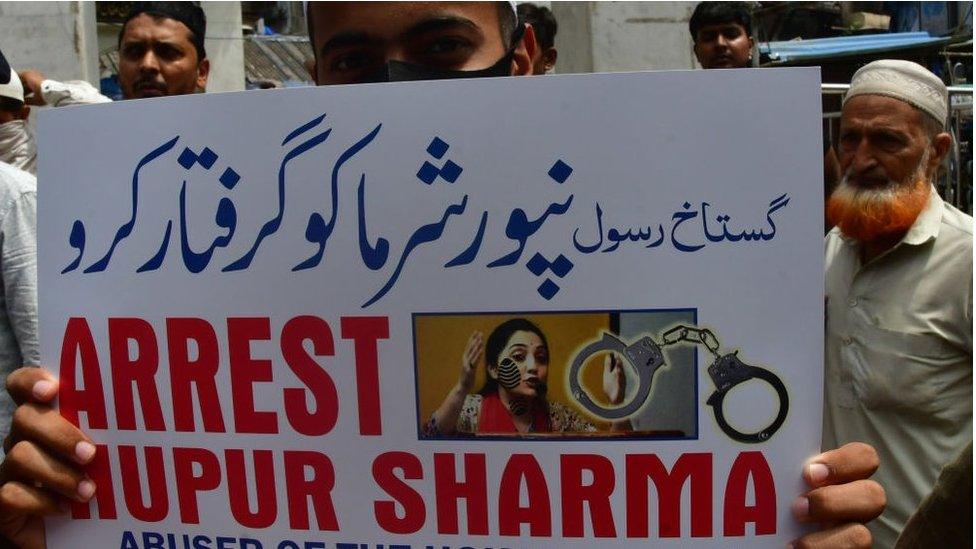
- Published18 May 2022
- Published2 September 2021
